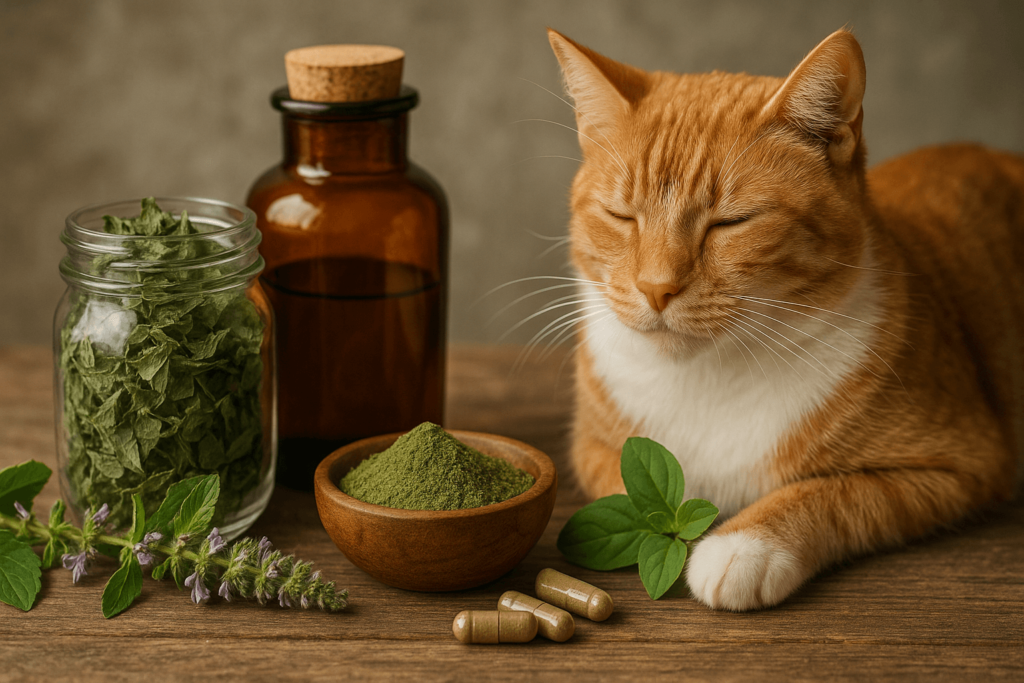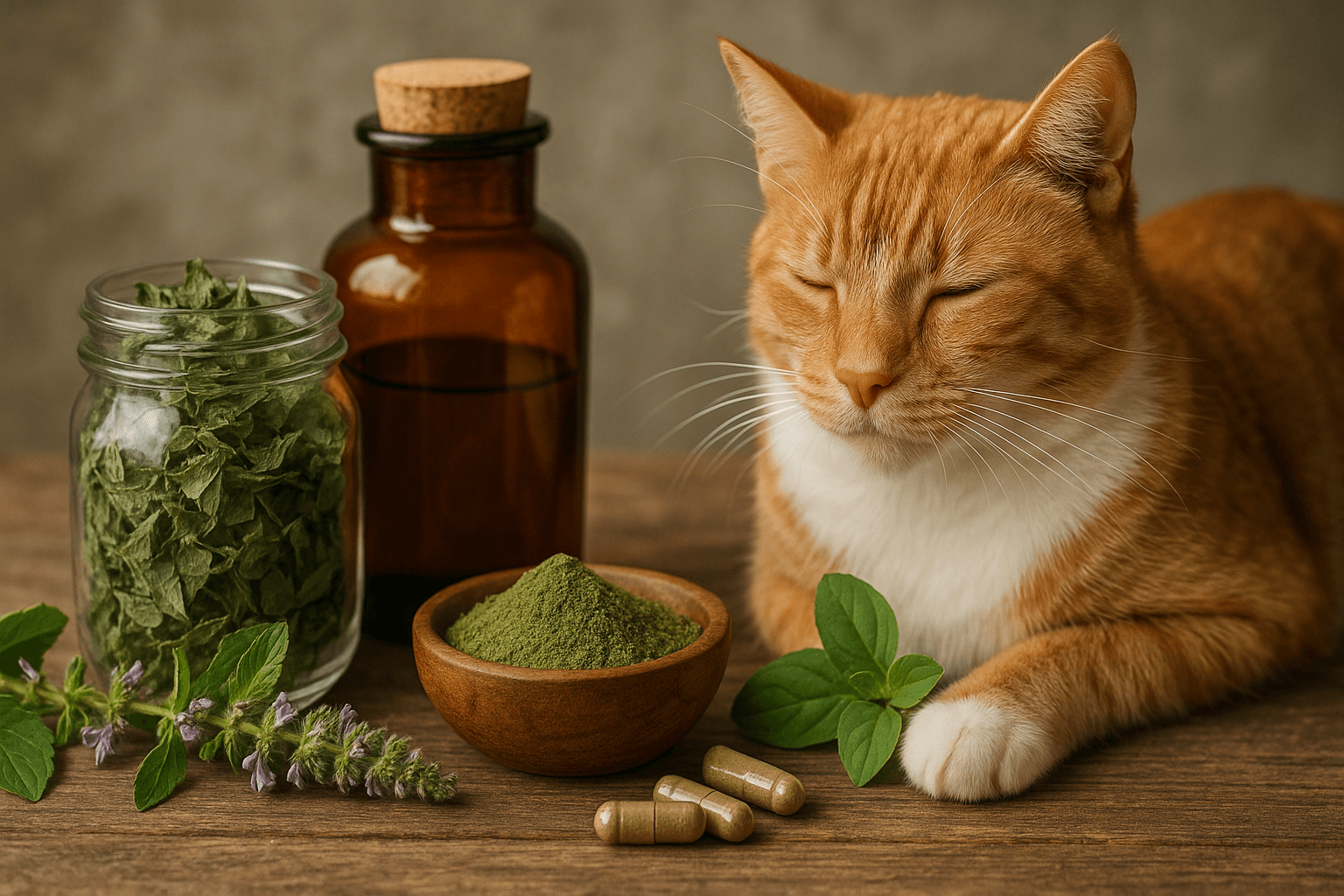Herbal Remedies for Cat Allergies: Gentle, Natural Support for a Healthier Feline
Cats with allergies suffer in silence—itchy skin, watery eyes, sneezing, and obsessive licking are signs many owners mistake for “just being cats.” But behind these symptoms lies a delicate immune imbalance, often triggered by pollen, dust, food, or environmental irritants. While conventional treatments offer relief, many pet parents seek gentler, holistic alternatives. Herbal remedies for cat allergies provide a natural path to soothe irritation, support immune resilience, and restore balance—without the side effects of steroids or antihistamines. When used wisely and under guidance, these botanical solutions can be a powerful complement to conventional care.
Why Cats Develop Allergies—and How Herbs Can Help
Allergies in cats aren’t random—they’re signals. A hypersensitive immune system overreacts to harmless substances, triggering inflammation and discomfort. Herbal remedies don’t suppress symptoms like drugs do; they work with the body to calm reactivity and strengthen resilience.
Reduce Inflammation Naturally:
Herbs like turmeric and chamomile contain potent anti-inflammatory compounds that soothe itchy skin and irritated airways without the risks of long-term steroid use.Support Liver Detoxification:
The liver filters toxins and allergens. Milk thistle and dandelion root help enhance its function, reducing the burden on an overworked system.Strengthen the Immune Response:
Adaptogens like astragalus help modulate immune activity—calming overreactions without weakening defenses.Soothe Respiratory Tracts:
Licorice root and mullein ease congestion and coughing by gently coating and calming irritated mucous membranes.Improve Skin Barrier Health:
Omega-rich herbs like calendula and nettle nourish the skin from within, reducing dryness, flaking, and secondary infections.
Herbs don’t offer instant fixes—but they offer lasting change. They work subtly, deeply, and holistically, helping your cat’s body return to balance, not just mask symptoms.

Top 5 Herbal Remedies for Cat Allergies—And How to Use Them Safely
Not all herbs are safe for cats. Their unique metabolism means some human-friendly plants can be toxic. These five have been studied and used by holistic veterinarians with proven safety and efficacy.
Turmeric (Curcuma longa):
Its active compound, curcumin, is a powerful anti-inflammatory. Mix a pinch of organic, food-grade turmeric powder with a teaspoon of coconut oil and add to wet food. Start with 1/8 tsp for small cats, max 1/4 tsp daily.Chamomile (Matricaria chamomilla):
Soothes itchy skin and calms anxiety. Brew weak chamomile tea, cool completely, and gently wipe affected areas with a soft cloth. Never give orally unless directed by a vet.Milk Thistle (Silybum marianum):
Protects and regenerates liver cells. Use only standardized, feline-safe liquid extracts (0.1–0.2 ml per 5 lbs body weight, once daily). Avoid raw seeds or capsules.Nettle Leaf (Urtica dioica):
A natural antihistamine rich in quercetin. Use dried, organic nettle in herbal teas (steep 1 tsp in 1 cup water, cool, then add 1 tsp to food 1–2x/week). Avoid fresh leaves—they sting.Calendula (Calendula officinalis):
Promotes skin healing and reduces redness. Apply diluted calendula tincture (1:10 with water) to hot spots with a cotton ball. Also safe in topical salves made for cats.
Always introduce one herb at a time. Monitor for changes in appetite, litter box habits, or behavior. If symptoms worsen, stop immediately and consult your vet.
Check this guide 👉Natural Cat Allergy Remedies: Best 7 Expert Tips!
Check this guide 👉Home Remedies for Cat Acne: Best 7 Expert Tips!
Check this guide 👉Home Remedies for Cat Mange: Best 7 Health Tips!
| Herb | Primary Benefit for Allergies |
|---|---|
| Turmeric | Reduces systemic inflammation and skin irritation caused by allergic reactions. |
| Chamomile | Calms itchy, inflamed skin and eases anxiety linked to chronic discomfort. |
| Milk Thistle | Supports liver detoxification to better process and eliminate allergens. |
| Nettle Leaf | Acts as a natural antihistamine to reduce sneezing, runny eyes, and itching. |
| Calendula | Heals broken skin, prevents infection, and restores moisture balance in allergy-damaged coats. |
How to Combine Herbal Support with Environmental Management
Herbs work best when paired with smart, allergen-reducing habits. A holistic approach addresses both the internal imbalance and the external triggers.
Switch to Hypoallergenic Food:
Many allergies stem from food. Try novel protein diets (duck, rabbit) or hydrolyzed formulas while introducing herbs.Use HEPA Air Purifiers:
Remove airborne allergens like pollen, dander, and mold that trigger respiratory reactions.Wash Bedding Weekly in Hot Water:
Cat dander clings to fabric. Hot water kills allergens and removes buildup.Limit Outdoor Exposure During High Pollen Seasons:
Keep windows closed and wipe paws with damp cloths after brief outdoor time.Avoid Scented Products:
Candles, air fresheners, and strong cleaners irritate sensitive airways. Opt for unscented, pet-safe cleaners.
Herbs treat the symptom. Environment treats the source. Together, they create a sanctuary for your cat’s health.
Dos and Don’ts of Using Herbal Remedies for Cats
Herbs are powerful—but misuse can be dangerous. Follow these guidelines to ensure safety and effectiveness.
Do:
Consult a holistic veterinarian before starting any herbal regimen, especially if your cat is on medication.Do:
Use only organic, pesticide-free herbs. Contaminants can worsen allergic reactions.Do:
Start with the smallest possible dose. Cats are sensitive—less is often more.Don’t:
Use essential oils internally or topically. Most are highly toxic to cats—even lavender and tea tree oil.Don’t:
Assume “natural” equals “safe.” Foxglove, yew, and lilies are plants—but deadly.Don’t:
Replace vet-recommended treatments without professional guidance. Herbs support—but don’t always replace—medical care.
Respect the power of plants. Treat them like medicine, not supplements.
Signs Herbal Remedies Are Working (And When to Adjust)
Progress with herbs is gradual. Don’t expect overnight miracles—but do track subtle improvements.
Reduced Scratching or Licking:
Fewer hairballs, less redness, and less broken skin indicate decreasing irritation.Clearer Eyes and Nose:
Less tearing, less nasal discharge, and fewer sneezes show improved respiratory health.Improved Coat Condition:
Dull, flaky fur becomes shinier and softer as inflammation decreases.Better Energy Levels:
Cats with chronic allergies often feel sluggish. Increased playfulness signals systemic improvement.Stable Appetite and Digestion:
Allergies can cause GI upset. Normal stool and consistent eating mean the immune system is calming.
If no change occurs after 3–4 weeks, the herb may not be right for your cat—or the dosage needs adjustment. Re-evaluate with your vet.
When to Avoid Herbal Remedies Altogether
Not every cat is a candidate for botanical support. Certain conditions require caution—or complete avoidance.
Pregnant or Nursing Queens:
Many herbs affect hormone levels or milk production. Avoid unless specifically approved by a vet.Cats with Liver or Kidney Disease:
Herbs are metabolized by the liver. In compromised cats, even safe herbs can become toxic.Cats on Immunosuppressants or Steroids:
Herbs like astragalus can interfere with these medications. Never combine without veterinary oversight.Kittens Under 6 Months:
Their systems are too immature for herbal processing. Stick to environmental management.Cats with Known Herb Sensitivities:
If your cat reacted badly to any plant-based product before, avoid herbal trials.
Safety first. Always err on the side of caution.
Creating a Daily Herbal Routine for Your Allergic Cat
Consistency is key. A gentle, structured routine helps your cat adapt and benefit fully.
Morning:
Add a tiny amount of turmeric-coconut mix to breakfast wet food (1–2x per week).Afternoon:
Wipe paws and face with cooled chamomile tea after playtime or window time.Evening:
Brush coat gently with a soft brush—this removes allergens and stimulates circulation.Weekly:
Add nettle tea (1 tsp cooled) to food 1–2 times per week. Rotate with calendula topical application on hot spots.Monthly:
Reassess symptoms. Keep a simple journal: “Day 1: Itching worse. Day 7: Eyes less watery. Day 21: Fur shinier.”
Small steps, daily care—this is how lasting healing happens.
FAQ: Herbal Remedies for Cat Allergies
Can I give my cat human herbal supplements?
No. Human supplements contain fillers, concentrations, or ingredients toxic to cats. Always use pet-specific or vet-approved formulations.
How long does it take for herbs to work?
Most cats show subtle improvements in 2–4 weeks. Full results may take 6–8 weeks. Patience is part of the process.
Are there any herbs that are poisonous to cats?
Yes. Lilies, garlic, onions, tea tree oil, pennyroyal, and eucalyptus are highly toxic. Never use them.
Can herbs cure my cat’s allergies?
No. Allergies are chronic conditions. Herbs manage symptoms and support immune balance—they don’t eliminate the root cause.
Can I use herbs alongside antihistamines?
Possibly—but only under veterinary supervision. Some herbs interact with medications. Never combine without professional advice.
Nurture Their Nature—Not Just Their Symptoms
Herbal remedies for cat allergies aren’t a quick fix. They’re a return to harmony. A way to honor your cat’s innate ability to heal—when given the right tools, the right environment, and the right care.
They don’t scream for attention. They don’t beg for relief. They simply endure—itching in silence, licking in secret, hiding their discomfort behind calm eyes.
Newfoundland Dog Personality: Best 7 Expert Tips! – Discover the gentle, loyal, and protective nature of this giant breed perfect for families.
Can Hot Pavement Burn Your Cats Paws? Best 7 Expert Tips! – Learn how to protect your cat’s paws from hot surfaces and prevent painful burns this summer.
Can Hot Pavement Burn Your Dogs Paws? Best 7 Expert Tips! – Learn how to protect your dog’s paws from hot surfaces and ensure safe summer walks.
Irish Wolfhound Size: Best 7 Expert Tips! – Discover the ideal height, weight, and care tips for this majestic giant breed. Learn how to manage their impressive stature responsibly.





